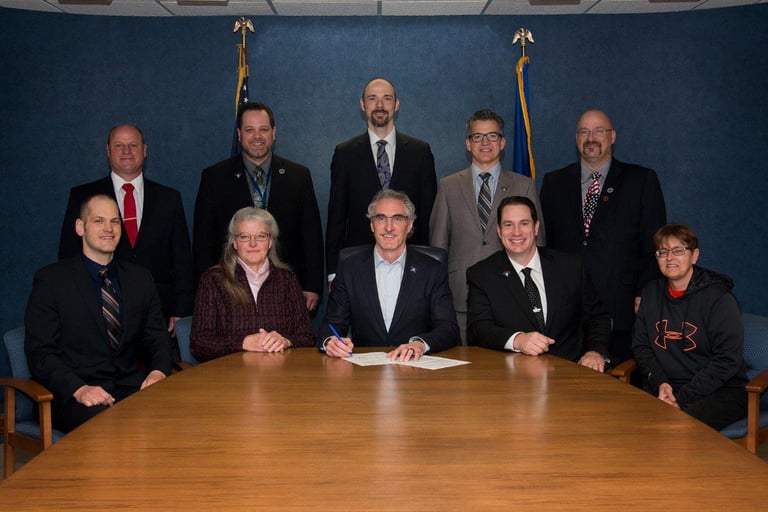A history of North Dakota Food Freedom's roots...
A few key supporters were privileged to watch the Governor sign Food Freedom into law.
Seated, left to right: Jared Hendrix, LeAnn Harner, Governor Doug Burgum, Representative Luke Simons, Bonnie Munsch.
Standing, left to right: Representative Jeff Magrum, Representative Daniel Johnston, Representative Chris Olson, Representative Rick Becker and Representative Bill Oliver.


The roots of Food Freedom were planted during the 2016 legislative campaign when political organizerJared Hendrix approached District 36 candidate Luke Simons with the concept. Jared was familiar with the newly passed Wyoming Food Freedom law. Luke, as an organic rancher already selling beef directly to consumers, eagerly agreed with the basic tenets of Food Freedom. After Luke's election, he reached out to his producer network for supporters. In January, 2017, goat dairy farmer LeAnn Harner met with Representative Simons and Jared Hendrix to draft legislation for North Dakota's own Food Freedom movement. The stage was set for a stunning change to the North Dakota food scene.Originally, the bill included the direct, unfettered sale of raw milk to consumers. Representatives Simons promoted the bill by drinking raw goat milk on the House floor. The raw milk provision met with stiff resistance in the House Ag Committee during an extremely contentious hearing attended by well over 150 people. Because the current milk share program was working, supporters agreed to remove raw milk sales from the bill in the interest of passing the majority of the legislation in the House.During the Senate Ag Committee hearing, the Department of Health proposed changes in the bill, most of which were cosmetic. They asked for the term "cottage foods" Supporters agreed with proposed changes, though we tried to clarify the wording on refrigerated foods, but the committee refused to make any changes. Still, the Senate passed the bill, the House concurred with the changes, and Governor Burgum signed the legislation. We were excited. The law would go into effect on August 1, 2017.
What did the law accomplish? ND has 27 local health districts, plus the state health department. Prior to the enactment of HB 1433, each health district could have different rules and regulations. If you went to farmers market in both Bismarck and Mandan, one might allow you to buy eggs from a farmer and the other wouldn't. Food Freedom made all those sales legal. Local ordinances can't deny your right to sell to consumers for use in their home. One supporter wrote: "To me it means that producers and consumers have the right to freely exchange anything that they make without the government interfering."
A few days prior to the effective date, the Department of Health convened a "Cottage Foods Working Group," which included employees from the Departments of Health and Agriculture, NDSU, Bottineau State College, several local health district staff members, two people selling vegetables through farmers markets and LeAnn Harner. While the "purpose" was to develop "guidelines" for implementing the new law, it was completely clear at the initial meeting that the Department of Health intended to write rules severely restricting products, despite a clear statement in the law that rules were not allowed. While the guidelines were supposed to be consensus driven, the overwhelming majority of the group were agency people wanting to regulate cottage food and the guidelines reflected that opinion. The issued guidelines - clearly stating things like low acid canned foods should not be allowed - caused confusion between producers. Some farmers markets restricted vendors from selling products that didn't meet the DOH guidelines.
In August, 2017, supporters celebrated the advent of Food Freedom with "Red Tape Cutting" events, featuring local representatives who supported the legislation. Despite confusion because of the guidelines, producers forged ahead. The Institute for Justice (IJ), a non-profit economic liberty group, contacted LeAnn Harner and warned her they would stand with Food Freedom if and when the Department of Health attempted to write rules that meshed with the guidelines. By January the Department announced rulemaking. While supporters scrambled to prepare more testimony and organize crowds for the Impending rule hearings, IJ wrote the Governor, Health Department and Attorney General, advising the State that, in IJ's opinion, rulemaking was not allowed by statute. Representatives Luke Simons and Aaron McWilliams (who had courageously shepherded Food Freedom through committee and on the floor) met with the Governor and rulemaking was withdrawn prior to public hearings. Supported breathed a sign of relief, continued to buy and sell goods, and waited anxiously for the next legislative session.
Despite NO INCIDENCES of foodborne illness attributed to these allegedly "dangerous" foods, Senator Jerry Klein introduced the Health Departments proposed rules as legislation in 2019. After a furious battle, with food Freedom warriors feeling like it was 2017 again, the Legislature turned back the revised proposal.
Our sigh of relief didn't last when the State Health Council was approved rules matching nearly word for word the defeated legislation later that year. Through many twists and turns , final rules were adopted and in place by January, 2020. Again, the Institute for Justice stepped in, this time suing the state on behalf of several cottage food producers who wished to follow the letter of the law and sell certain items banned by the rules. Though court cases take time, by January of 2021, the case was settled and rules thrown out. We were back to the original law passed in 2017.
It should be noted that, while the Department of Health led the charge to fight Food Freedom and regulate it, the Department of Agriculture did nothing to assist local producers, even when the Health Department proposed restricting things like the number of hens from which you can sell eggs - which is clearly part of the Ag Department's rules. So much for the Ag Department's support of "local food!"
If you'd like to learn more, please check out our Timeline OR this page about the 2023 raw milk bill.
Copyright North Dakota Food Freedom 2023
